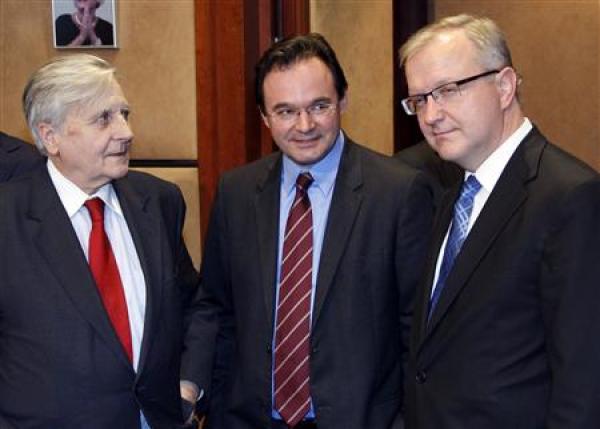Euro ministers discuss Greek standby aid planning
16 Μαρτίου 2010
Euro zone finance ministers discussed the mechanics of a financial rescue for Greece on Monday but gave few details of their standby planning as Athens tries to fix its public finances alone.
The rescue would be the first for the monetary union that created the euro in 1999 and the Greek government has been pressing European capitals to go beyond a vague political pledge of support for the debt-stricken country.
“We will discuss several options this evening … to find a solution if one is needed,” said Jean-Claude Juncker, prime minister of Luxembourg and chairman of the talks in Brussels.
Dutch Finance Minister Jan Kees De Jager said many countries would be involved if it came to it, but any help would be tied to tough conditions of the kind that the International Monetary Fund applies when rescuing countries that are in trouble.
“If we talk about measures, for example about loans, they will follow the same kind of methodology as the IMF,” he told reporters as he arrived for the evening talks with colleagues from the 16-country euro zone. “This is not a bailout.”
The euro lost some ground versus the U.S. dollar on Monday, hampered by what some analysts described as a lack of progress on a financial aid package for Greece. It traded down 0.8 percent on the day at $1.3658 and down from Friday’s four-week high close to $1.3800.
European Central Bank President Jean-Claude Trichet, who was also attending the Brussels talks, said the currency was in safe hands. “The euro is certainly not in danger,” he said in a Euronews television interview.
Greek government bond prices lost a little ground after comments by a German government spokesman reduced expectations in financial markets of an imminent announcement of concrete rescue terms for Greece.
EUROPEAN COMMISSION HAS PLAN
The European Commission, the European Union’s executive body, said it was ready to propose a framework that could be used for Greece, despite signs of reluctance from France and Germany to announce concrete commitments.
European Monetary Affairs Commissioner Olli Rehn said the Commission was ready to put proposals to ministers now that Athens had come up with an ambitious austerity plan to cut its deficit and tame a debt bigger than its economic output.
“We will also discuss how to safeguard financial stability in the euro area as a whole,” he said. “The Commission is ready to table a proposal for a European framework for coordinated and conditional assistance.”
Praising Athens’ austerity moves, OECD Secretary General Angel Gurria told Reuters in the Greek capital: “Greece deserves to be supported given the package and the policy measures that it has announced.”
He said support should take the form of “something markets will understand and something which will allow Greece to reduce the cost of its borrowing.”
Germany, Europe’s biggest economy and the country that would be the linchpin of any support, is reluctant to bail out Greece. It says Athens’ priority must be to get its finances in order and make deep structural adjustments to rein in spending.
Market prices for Greece’s debt initially rose on hopes of a more detailed commitment by the meeting, but analysts said a failure to do so could spark more selling.
“No political decisions will be made,” a German government spokesman said of Monday’s meeting. Those comments played down talk at the weekend that a detailed plan could be in the offing.
The German spokesman reiterated that Greece had not asked for support and was working to resolve its problems by itself.
DEFICIT-CUTTING MEASURES
Greece this month unveiled extra austerity measures to knock its deficit from 12.7 to 8.7 percent of gross domestic product, including cuts in public sector pay and tax hikes. A poll on Sunday showed most Greeks saw it as a good step.
The measures and the euro zone’s verbal backing have helped ease the premium Greece must offer over benchmark German bonds as it seeks to refinance some 20 billion euros ($27.5 billion) in debt that it has to roll over in April and May.
But the so-called spread, or debt financing premium, remains unsustainable, analysts say, and policymakers are looking at what could be done to insulate Athens against market turbulence and a risk of default that has hurt the euro.
Under EU rules, neither the bloc nor individual states can assume the debts of other countries, but loan guarantees or similar measures would circumvent those restrictions.
French Economy Minister Christine Lagarde said at the weekend she did not expect any figure for aid to be announced.
“I’m certainly not expecting any decision being made, or any button being pressed … it’s totally premature,” she said.
On Saturday, Britain’s Guardian newspaper quoted sources as saying the meeting would agree up to 25 billion euros of support. A senior EU source said that was not on the table.
(With reporting by Brian Rohan, Tamora Vidaillet and Ilona Wissenbach in Brussels and Paul Carrel and Madeline Chambers in Berlin; Writing by Brian Love and Luke Baker; Editing by Timothy Heritage and Dale Hudson)
Source: http://www.reuters.com/article/idUSTRE62D0WP20100315?feedType=nl&feedName=ustopnewsearly




